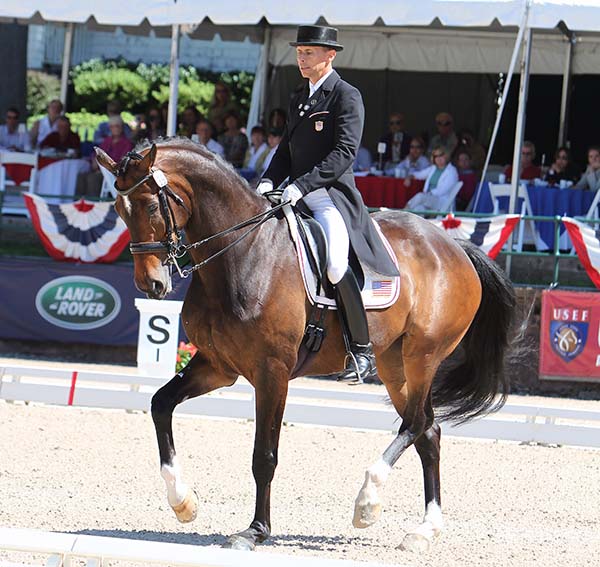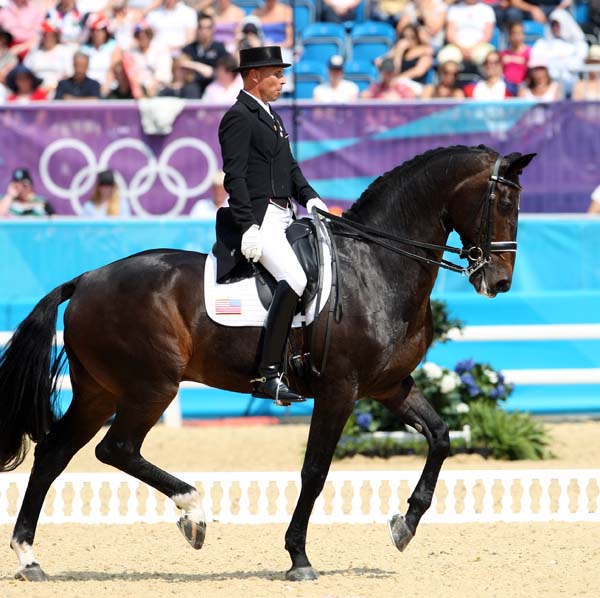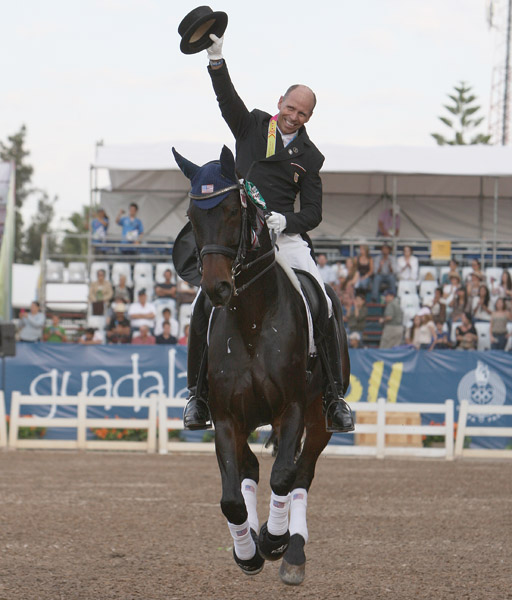Steffen Peters on Olympics Past & Future, Development of USA Dressage – Part 1 of 3
12 years ago StraightArrow Comments Off on Steffen Peters on Olympics Past & Future, Development of USA Dressage – Part 1 of 3

By KENNETH J. BRADDICK
Admitting that the final performance of Ravel at the Olympics in summer left a scar, Steffen Peters is anxious to compete Legolas against the best in the world to see whether the 10-year-old gelding “is good enough in the big picture” to lead a completely new United States team in world championships and the next Olympics in Rio de Janeiro in 2016.
Steffen, who has held the mantle as the top American rider since the World Equestrian Games in Aachen, Germany in 2006 and set new benchmarks as an individual with Ravel at World Cup, WEG and two Olympics, is looking to Legolas and Paragon, trained and ridden by Heather Blitz, to breathe life into U.S. hopes of their team being on the medals podium at future championships. The U.S. has failed to place in the last two Olympics after four straight Games in which the nation won team bronze.
In a candid interview with dressage-news.com four months after he and Ravel were the sole U.S. combination to make it to the Grand Prix Freestyle after a sixth place finish for the team, Steffen, based in San Diego, California said of the London Olympic experience:
“Looking back, it depends on how you sell it to yourself. We could say that the six years wih Ravel were amazing. You could look at that and be happy what we did for the team, how we ended up overall. But in the freestyle in London there were three obvious mistakes. That placing of Ravel (17th) is pretty heavy.
“I’m getting over it. Looking back that did leave a scar. But I don’t want to just say, ‘we didn’t do well’.
“I need to show responsibility, accountability for that. Not just look at the past and say that overall Ravel and we had a great career.
“I ask myself many times, ‘Could I have done somehing different?’ I honestly don’t think so.
“I think we did everything we could possibly do. We prepared Ravel exactly the way we prepare for any other major competitiom. I don’t think I could have done something different.
“It did take the wind out of my sails.
“Did that discourage me from moving forward.
“Absolutely not.
“Working out in the hotel gym with Shannon (his wife) the next morning we decided, ‘Let’s start training for Rio.’
“What defines us as athletes is not just dealing with success but how you deal with disappointments. It’s a good lesson to learn.
“I’m excited we have a hell of plan in place for the next four years. Hopefully, I’ll get another shot at it.”

Steffen, now 48, was born and raised in Germany but has completely embraced the American lifestyle. He lives in one of the most desirable cities on the Pacific coast with a moderate temperature year round that offers a raft of opportunities to indulge his non-horse passions of water sports, gunning one of his motorbikes and outdoor entertaining with Shannon, an accomplished trainer and competitor who is his partner in all aspects of their professional and personal lives.
In his first U.S. Olympic team experience on Udon at Atlanta in 1996 he contributed to the result that produced a bronze medal. The next 10 years were mostly out of the international limelight. Then aboard the aging Floriano he led the United States team to a bronze medal at the world championships in Aachen, Germany in 2006.
At the same WEG, he was able to take a drive with Akiko Yamazaki who wanted to invest in a horse that Steffen could be competitive at the next Olympics, Beijing in 2008. That horse was Ravel, then a stallion and with Edward Gal in the Netherlands.
The venture was successful in that Steffen and Ravel, who was gelded after a bad quarantine experience, was only 10 years old when the KWPN horse (Contango x Hautain x Democraat) placed third in the Grand Prix Freestyle at the 2008 Olympics Games but missed out on winning a second individual dressage medal for the U.S., the only previous one being Col. Hiram Tuttle and Olympic winning bronze at Los Angeles in 1932. Individual medals for the Beijing Games were for combined Grand Prix Special and Freestyle results.
The next year, 2009, demonstrated their prowess–first claiming the World Cup title, only the second U.S. combination to do so, then became the first American combination ever to sweep the CDIO championship of Grand Prix, Special and Freestyle at the world’s premier horse show, Aachen. And they followed up in 2010 with two individual bronze medals at the WEG in Kentucky after the team qualified the U.S. for London with a fourth place Nations Cup finish.
Steffen focused on his first Pan American Games in 2011–although equestrian competition is at small tour, the Pan Ams are the second largest multisport championship after the Olympics and are the continental qualifier for the Games. Aboard Weltino’s Magic, he led the U.S. team to gold and a sweep of individual medals.

A couple of months before the Pan Ams, though, he took Weltino’s Magic to Aachen to sweep the small tour.
And to the delight of the knowledgeable German crowd, created one of the highlights of the show when the spectators made it clear by their booing and cheering that Ravel should have been declared the winner of the Grand Prix Freestyle and not Totilas that was being competed for Germany and not with Edward Gal of the Netherlands who had made the black stallion perhaps the greatest dressage superstar in history.
The Olympics in London was, however, the primary target. He and Ravel were not only the top American combination, Steffen is held in the highest regard in Europe seen to display extraordinary skills as a trainer and rider of softness, suppleness and throughness–a style he labels as neither German nor Dutch but American. He doesn’t profess to “whisper” to his horses but to listen to them.
Initial preparations for the Olympics did not go as hoped, though. At an April show in Del Mar, just a few miles from his San Diego base, “Ravel wasn’t jogging the way we wanted,” he said. “It was not as perfect as we hoped.”
Ravel was excused from competing in the U.S. selection trials and, as allowed by the rules, was named to the London squad, with Legolas as the newly crowned U.S. Grand Prix champion going to Europe just in case.
“As a team I think we need to measure ourselves, both as a team and as individuals, against others in the world to get a better picture of where we stand, and that means going to Europe,” he said.
“Competing Ravel in Europe was not an option, though. We would have jeopardized a possible start. However, the health of the horse comes first and we made the right decision to not put Ravel through that.”
Training camp in England was “simply wonderful” with coaching and critiquing of the team members of Steffen and Ravel, Tina Konyot and Calecto V and Jan Ebeling and Rafalca with Adrienne Lyle and Wizard as an individual starting pair and Heather Blitz and Paragon as the reserve. The squad studied videos of their own and each other’s rides as well as many of the world’s top partnerships.
Disappointment in the Freestyle result was not limited to Americans. Dressage fans in Europe and around the world who had followed their successes on the biggest stages shared the pain.
However, Legolas is Steffen’s mount for the futue.
In another investment in U.S. high performance dressage, Akiko Yamazaki bought the Westfalen gelding (Laomedon x Furstin x Florestan II) as a successor to Ravel. The horse had been trained to Grand Prix by Ullrich Kasselmann of Performance Sales International of Hagen, Germany.
Legolas arrived at Steffen’s barn at Christmas a year ago with no international performances to his credit.
Steffen is realistic about Legolas’s record since–four CDIs and a handful of national competitions in California with the reputation in Europe of inflated results as well as the U.S. Grand Prix title determined by panels of primarily American judges.
“I don’t believe in just promoting a horse,” Steffen said. “At the end of the day horses have to prove themselves with the scores they get.
“We still haven’t done that with Legolas. Despite the CDIs in California and the championshp the question is whether he is good enough in the big picture.
“I’m excited to get a chance to explore this in Florida at the World Dressage Masters in January.
“I’m ready and the scores will tell the truth. I hope some horses will be at the WDM who are getting 80 per cent so we can compare our performances that will give us a really good picture of where we are.”
He and Legolas will likely get that chance.
Almost certain to compete at the WDM is Tinne Vilhelmson-Silfvén and Don Auriello, Sweden’s six-time Olympian who rode the 10-year-old to their best ever score of more than 84 per cent at the Stockholm International Horse Show World Cup event the first week of December. And Heather Blitz and her homebred Paragon that Steffen thinks is a top partnership will also likely be seeking to unseat them as the top American combination.
Part 2–Legolas Freestyle, Steffen’s view of American dressage.

